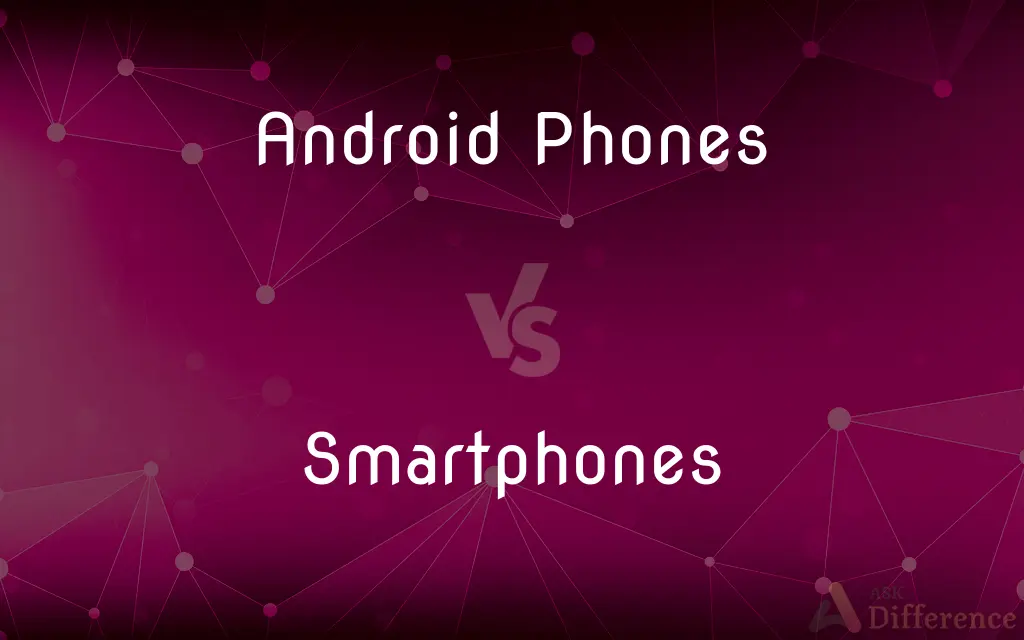Android Phones vs. Smartphones — What's the Difference?
By Maham Liaqat & Fiza Rafique — Published on November 23, 2024
Android phones run on Google's Android OS, offering a wide range of apps and customization. Smartphones are any mobile phones with advanced features like internet connectivity, irrespective of the OS.

Difference Between Android Phones and Smartphones
Table of Contents
ADVERTISEMENT
Key Differences
Android phones, powered by Google's Android operating system, are known for their open-source nature, allowing extensive customization and a diverse app ecosystem. This flexibility has made Android devices highly popular worldwide, appealing to users who value personalization and a wide range of choices in hardware.
Smartphones, on the other hand, refer to any mobile phone that offers advanced functionalities beyond traditional calling and messaging. This includes internet connectivity, app usage, and multimedia capabilities. Smartphones can run on various operating systems, including iOS, Android, and others, making the term "smartphone" a broader category that encompasses all such advanced devices, including Android phones.
Android phones are lauded for their customizable interface and the ability to install apps from third-party sources, while smartphones, in general, are appreciated for transforming how we communicate, work, and entertain ourselves, regardless of the operating system they run on.
The ecosystem of apps available on Android phones is vast, thanks to the Google Play Store and other third-party app markets. This openness has fostered a rich development community, pushing the boundaries of what mobile apps can do.
Smartphones, irrespective of their operating system, have driven significant advancements in mobile technology, including camera capabilities, mobile payments, and health tracking. These features have become standard expectations for users, shaping the way manufacturers design and market their devices.
ADVERTISEMENT
Comparison Chart
Operating System
Android OS
Various (iOS, Android, etc.)
Customization
High
Varies by OS
App Ecosystem
Open (Google Play Store and third-party apps)
Varies (e.g., Apple App Store for iOS)
Target Users
Users seeking customization and variety
General mobile users seeking advanced features
Hardware Variety
Wide range from multiple manufacturers
Varies widely across different OS platforms
Compare with Definitions
Android Phones
They often feature integration with Google services.
His Android phone's seamless integration with Google Drive made file sharing easy.
Smartphones
They support a wide range of applications.
He used his smartphone to track his daily steps and monitor his health.
Android Phones
Android phones come in a variety of hardware options.
She preferred Android phones for their diverse range of sizes and features.
Smartphones
Smartphones have become essential for mobile photography.
She captured stunning photos of the sunset using her smartphone's advanced camera.
Android Phones
Android phones use Google's Android operating system, known for its customization.
She downloaded a custom launcher on her Android phone for a personalized interface.
Smartphones
Smartphones are advanced mobile phones with internet connectivity.
Her smartphone kept her connected with friends on social media.
Android Phones
Allows installation of apps from third-party sources.
He installed a game from a third-party store on his Android phone.
Smartphones
Offer features like mobile payments and digital wallets.
He paid for his coffee using his smartphone's mobile payment feature.
Android Phones
The platform is known for its open-source nature.
Developers love Android phones for the ability to tweak the system's open-source code.
Smartphones
Smartphones vary widely in operating systems.
They compared smartphones to find one that matched their preferred operating system.
Smartphones
Plural of smartphone
Common Curiosities
Can smartphones operate without an internet connection?
Yes, smartphones can operate without an internet connection for basic functions like calling and texting.
Is every Android phone a smartphone?
Yes, every Android phone is considered a smartphone due to its advanced features.
Do all smartphones have touchscreens?
Yes, most modern smartphones have touchscreens as a standard feature.
Can smartphones replace traditional cameras?
For many users, smartphones have replaced traditional cameras for everyday photography.
Are there any smartphones that don't use Android or iOS?
While rare, there are smartphones that use alternative operating systems, though they are less common.
Do all Android phones have access to Google services?
Most Android phones have access to Google services, although some manufacturers offer devices without them.
Are all smartphones Android phones?
No, not all smartphones are Android phones; they can run on various operating systems.
What makes Android phones unique compared to other smartphones?
Android phones are unique for their high level of customization and open-source nature.
Are smartphones considered mobile computers?
Yes, smartphones are considered mobile computers due to their advanced computing capabilities.
What is the most popular operating system for smartphones?
As of my last update, Android and iOS are the most popular operating systems for smartphones.
Can Android phones use apps from the Apple App Store?
No, Android phones cannot use apps from the Apple App Store, which is designed for iOS devices.
Do Android phones offer any privacy advantages?
Privacy features vary by device and manufacturer, but Android offers customizable privacy settings.
What's the average lifespan of a smartphone?
The average lifespan of a smartphone varies but typically ranges from 2 to 5 years.
Can smartphones function as gaming devices?
Yes, smartphones can function as gaming devices, with many models offering advanced graphics and processing power.
Can I customize the interface of any smartphone?
The level of customization varies, with Android phones generally offering more options than others.
Share Your Discovery

Previous Comparison
Fundamental Unit vs. Derived Unit
Next Comparison
Red Light vs. Blue LightAuthor Spotlight
Written by
Maham LiaqatCo-written by
Fiza RafiqueFiza Rafique is a skilled content writer at AskDifference.com, where she meticulously refines and enhances written pieces. Drawing from her vast editorial expertise, Fiza ensures clarity, accuracy, and precision in every article. Passionate about language, she continually seeks to elevate the quality of content for readers worldwide.












































